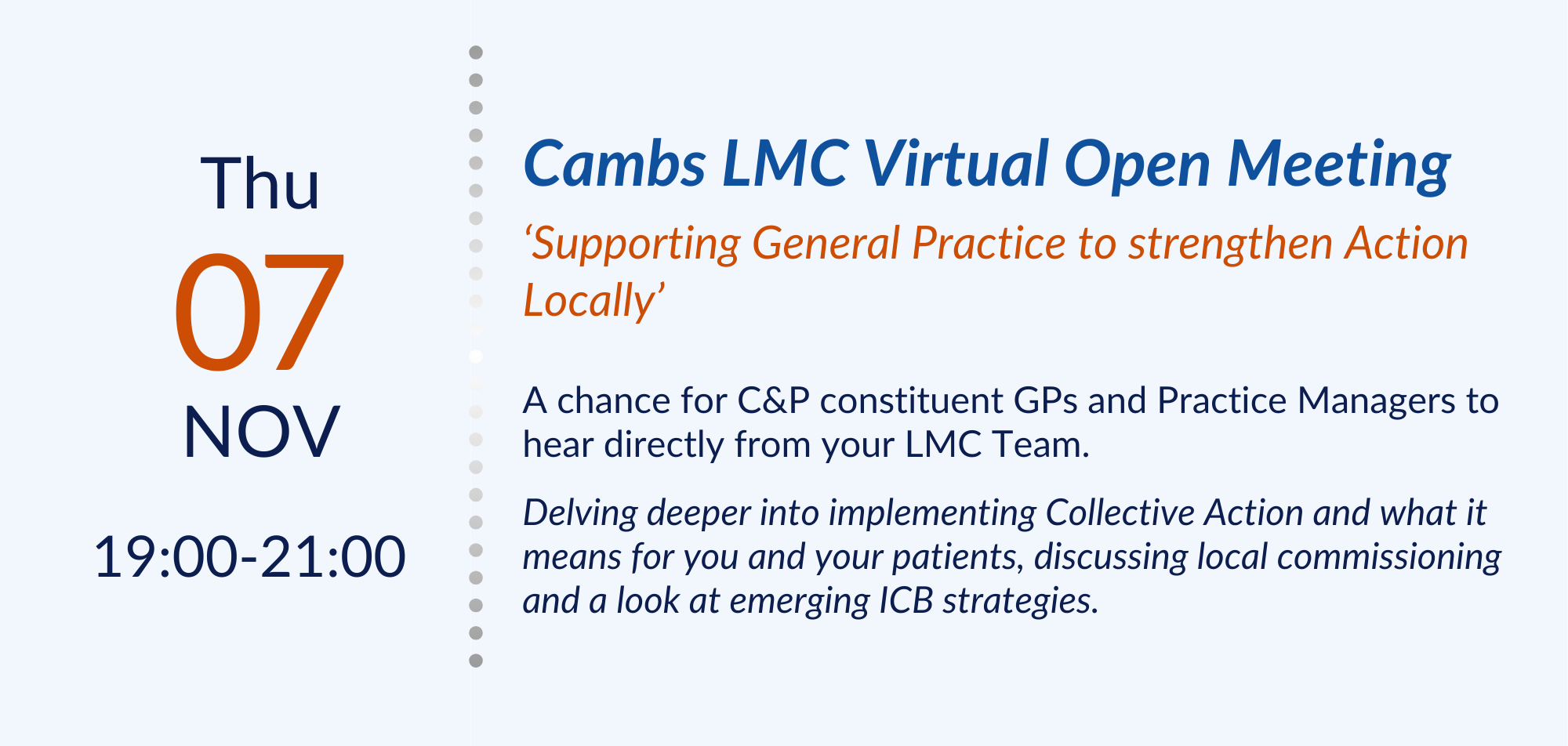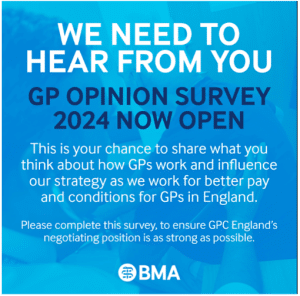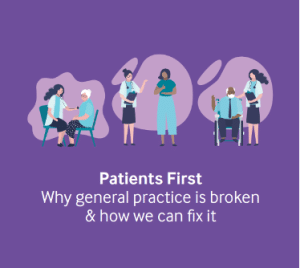LMC Update – 25 October 2024

BMA GP Opinion Survey 2024
The latest BMA GP Opinion Survey has opened, and we need to hear from all GPs across the country.
This annual survey gathers GPs’ views on current issues and opportunities facing General Practice, helping to influence and inform this year’s contract negotiations in addition to our longer-term strategy of promoting and protecting the future of General Practice.
The survey is open to all GPs in England, including partners, salarieds, locums, and GP registrars at ST3 and above. It is open to GPs working in all settings and practices, wider primary care roles, trusts, urgent care, and secure or out-of-hours settings.
Participants do not need to be a member of the BMA to participate but we will need a GMC number to ensure that responses are coming from eligible GPs based in England. All responses will be anonymised.
The survey will close on Monday, 11 November at 9am. We urge you to complete the survey as soon as possible, to ensure GPC England’s negotiating position is made as strong as possible.
Take the survey here: https://www.research.net/r/FP9JLQJ
BMA vision for General Practice
BMA has launched the vision for general practice Patients First: why general practice is broken and how we can fix it, presenting solutions for the new Government to work with BMA in rebuilding a transformed general practice for the benefit of patients and communities, and improving the long-term health of the nation.
GPs need an extra 11p per day, that’s £40 per patient per year in 2025/26 to provide the patient care that is needed. This investment will help support safer, better continuity of care for our patients, recruiting more GPs and delivering more appointments.
BMA has shared Patients First: Why General Practice is broken and how we can fix it with the Secretary of State for Health, the Department for Health and NHS England. We look forward to working with them to bring about necessary changes, working to shape policies that will help fix the front door to the NHS and bring back the family doctor.
Safeguard general practice, and you safeguard the NHS.
Please share this vision with patients, friends and colleagues, while continuing to take collective action that will protect our patients and our practices www.bma.org.uk/patientsfirst and read the BMA press statement.
BMA Collective Action
Thank you to every practice now taking part in BMA collective action to protect our patients and practices. These actions have already, and will continue to make a difference: they are safe, sustainable, and do not breach your contract. Most importantly, these actions are turning up the pressure on the Government to do the right thing for patients and general practice. We are the bedrock of the NHS, but our services have been driven to near collapse.
We need you to take action to protect our patients and protect our practices.
BMA Focus On Action – Serving notice on voluntary services
BMA is producing more guidance around individual collective actions to support those practices in undertaking specific actions. This weeks focus is on serving notice on voluntary services.
Watch the two minute collective action video on unfunded work which shows GPCE colleagues’ views on this specific collective action. BMA is asking you to consider serving notice on any voluntary services currently undertaken that plug local commissioning gaps and stop supporting the system at the expense of your patients, practice and staff. BMA recommends liaising with your LMC for advice around communications and notice periods required (if any), around the cessation of these services, or alternatively contacting info.gpc@bma.org.uk for further information and advice.
The GP campaign page has more information about all of the actions.
Please also refer to the Safe Working Guidance Handbook and other useful links such as guidance for GP collective action, background to the 24/25 contract changes, and infographics that can be displayed in practices.
GP Additional Roles Reimbursement Scheme (ARRS)
The updated PCN DES bringing in the GP ARRS was released last week. GPs employed via the Scheme must be within 2 years of their CCT on 1/10/24 and PCNs will be required to provide terms no less favourable than the BMA salaried GP model contract, in line with the GMS/PMS contract.
GPC England and the Sessional GPs Committee have released guidance for PCNs, and individuals employed under this scheme. It can be found here.
Whilst there is progress in acknowledging the difficulties currently faced by many GPs struggling to find jobs, we continue to stress to NHSE and the Department of Health the underlying issue of GP unemployment and how this needs to be better addressed through additional support and funding at a practice level, reinforcing the need for a new GP contract to support this.
Read the blog by Dr Mark Steggles, Chair, Sessional GPs Committee
GPs vote in favour of phasing out physician associate role in general practice
Following the publication of the GPC England and RCGP guidance on the role of physician associates, the GPs Committee UK (GPC UK) met on 17 October and discussed the role and safety of physician associates in general practice. The committee overwhelmingly voted in favour of the motion below:
This meeting believes that the role of physician associates in general practice is fundamentally unsafe and:
- there should be no new appointments of physician associates in general practice
- the role of physician associates in general practice should be phased out
- the role of a physician associate is inadequately trained to manage undifferentiated patients, and there should be an immediate moratorium on such sessions.
The BMA believes that those in existing physician associate roles should be given opportunities to retrain into more suitable NHS roles, including the appropriate undergraduate and postgraduate training in medicine.
The priority needs to be the recruitment and retention of more GPs into the workforce. We want to be able to give patients the care and services they need, when they need them, with the most appropriate clinician. The Government must urgently invest in practice staff such as GPs and general practice nurses. Read the full press statement here
BMA legal action on MAPs
The BMA is to financially back a legal challenge against the GMC over its failure to distinguish between doctors and PAs (physician associates).
Campaign group Anaesthetists United has been joined by the parents of 30-year-old Emily Chesterton, who died after seeing a PA who she thought was a GP, in their legal action. Together, they allege that the GMC has not enforced a national scope of practice for MAPs (medical associate professionals) after they graduate, which they argue represents an unlawful failure in the GMC’s duty to properly regulate the clinical practice of these associate professions in the UK.
This follows legal proceedings started by the BMA against the GMC in June on the GMC’s decision to use Good Medical Practice for PAs and AAs rather than creating specific standards for those professions, and the GMC’s use of the term ‘medical professionals’ for PAs and AAs.
Use of patient data for research
Following the Health Secretary’s speech at the RCGP Conference, where it was stated that NHS England would take care of primary care data for research, where patients had consented for it to be used in studies, Dr David Wrigley (GPC England Deputy Chair and IT lead) commented:
“Research is fundamental to improving public health, and the BMA has been in conversation with NHS England, the Government, and relevant research organisations about how to safely make the data of those patients who have given explicit consent available for this use.
“We are pleased Government will thoroughly review the consent processes used by these research organisations and will take full responsibility for the safe and proper onward sharing of that data which originates from the GP record. We have made it clear that the agreement is strictly limited to circumstances where patients have given – and continue to give – their informed consent to the sharing of their medical record.
“Patient data is incredibly valuable, and we are pleased to see the Government has also committed to ensuring the highest security arrangements for its protection and appropriate use.”
GP contract changes and implementation
Here is a reminder of what has been uplifted from this month: Global sum has been uplifted to £112.50 per weighted patient for GP practices to implement the DDRB uplift. Locum reimbursement rates have increased, along with the pay elements of workforce-related transformational funding.
From 1 October, newly qualified GPs can be recruited as part of the additional roles reimbursement scheme (ARRS) and PCNs can request the funding as outlined in the updated PCN contract DES. In addition, three other PCN funding streams have been increased to reflect the DDRB uplift: core PCN support, the care home premium service and the enhanced access service. The maximum reimbursement rates for existing ARRS staff have been uplifted with effect from 1 October to align with Agenda for Change pay scale uplifts.


